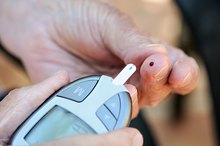How to Remove Excess Iron in Blood
Iron overload, or hemochromatosis, occurs when too much iron accumulates in the blood. Left untreated, it can cause organ damage. Hemochromatosis is mainly genetic but can also be caused by too many blood transfusions from certain anemias. It's the most common genetic disorder in the United States.
Excess iron must be removed from the body by phlebotomy, the procedure used for donating blood. You can have the procedure done in a hospital, clinic or outpatient care center. A nurse or a certified phlebotomist applies a tourniquet and then places a needle in a dominant vein.
How Long Does Iron Stay in Your System?
Learn More
The blood drains into a large collection container. The amount of blood drawn and length of time phlebotomy must be done depends on the severity of the iron overload. A pint of blood is removed once or twice a week. Your physician determines the length of time; it can be a few months to a year or more.
Following the blood draw, you may experience weakness or lightheadedness. You should eat a snack, such as cookies or crackers, which are provided for blood donors. Don't attempt to get up or walk until you feel back to normal. If doing phlebotomy on an outpatient basis, it's a good idea to have someone drive you.
Pros & Cons of Giving Blood
Learn More
During iron overload treatment, frequent labwork, including checking blood ferritin levels, is necessary to follow the progress of treatment. Once all bloodwork is within normal range, patients still have to have blood removed two to four times a year. Management of iron overload is lifelong and may require diet modifications to avoid consuming too much iron.
Tips
Symptoms of iron overload include joint pain, fatigue, abdominal pain, lack of energy, loss of sex drive and heart problems. Many people have hemochromatosis and have no symptoms.
Warnings
Lack of treatment can cause serious problems, including arthritis, damage to the pancreas, thyroid deficiency, adrenal gland damage and irregular heart rhythms or heart failure. The liver is especially vulnerable and can develop cirrhosis, cancer, liver failure or enlargement.
Related Articles
References
Resources
Writer Bio
Roma Lightsey has written for "Grit," "Arthritis Today," and "The Clinical Advisor," a journal for nurse practitioners. Lightsey holds a Bachelor of Arts in communications, a Bachelor of Science in nursing, and a Masters of Science in nursing. She currently teaches nursing and works for a medical device company when not busy writing.









